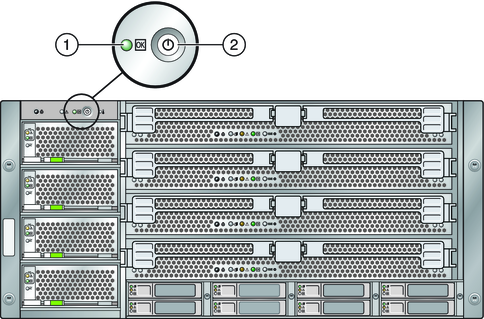| Skip Navigation Links | |
| Exit Print View | |

|
Sun Fire X4800 Server Product Documentation |
Administration, Diagnostics, and Service
Overview of the Diagnostics Guide
Introduction to System Diagnostics
How to Gather Service Visit Information
How to Troubleshoot Power Problems
How to Externally Inspect the Server
How to Read the DIMM Fault LEDs
Identifying DIMM Error Messages
How BIOS POST Memory Testing Works
How to Interpret DIMM Error Messages in the SEL
How to Isolate and Correct DIMM ECC Errors
Default BIOS Power-On Self-Test (POST) Events
Using the ILOM to Monitor the Host
Viewing the ILOM Sensor Readings
How to Use the ILOM Web Interface to View the Sensor Readings
How to Use the ILOM Command-Line Interface to View the Sensor Readings
How to View Fault Status Using the ILOM Web Interface
How to View Fault Status With the Command-Line Interface
How to Clear Faults in the Web Interface
How to Clear Faults Using the Command-Line Interface
Viewing the ILOM System Event Log
How to View the System Event Log Using the ILOM Web Interface
How to View the System Event Log With the ILOM Command-Line Interface
How to Clear the System Event Log Using the ILOM Web Interface
How to Clear the System Event Log Using the ILOM Command-Line Interface
Interpreting Event Log Time Stamps
How to Reset the ILOM SP Using the Web Interface
How to Reset the ILOM SP Using the Command-Line Interface
Creating a Data Collector Snapshot
How to Create a Snapshot With the ILOM Web Interface
How to Create a Snapshot With the ILOM Command-Line Interface
Using SunVTS Diagnostics Software
Introduction to SunVTS Diagnostic Test Suite
How to Diagnose Server Problems With the Bootable Diagnostics CD
Performing Pc-Check Diagnostic Tests
How to Run Pc-Check Diagnostics
How to Perform Immediate Burn-In Testing
How to Create and Save Scripts for Deferred Burn-in Testing
How to View Pc-Check Files With the Text File Editor
How to View Test Results Using Show Results Summary
Graceful shutdown: Press and release the Power button on the front panel. This causes Advanced Configuration and Power Interface (ACPI)-enabled operating systems to perform an orderly shutdown of the operating system. Servers not running ACPI-enabled operating systems will shut down to standby power mode immediately.
Emergency shutdown: Press and hold the Power button for four seconds to force main power off and enter standby power mode.
When main power is off, the LED is not lit.
 | Caution - When you use the Power button to enter standby power mode, power is still directed to the service processor board and power supply fans, indicated when the Power/OK LED is flashing. To completely power off the server, you must disconnect the AC power cords from the back panel of the server. |
See the following illustration for the location of the Power button.

|
For instructions on removing the CPU module, refer to the Sun Fire X4800 Server Service Manual.
For the LED locations and descriptions of their behavior, see Troubleshooting DIMM Problems.
For a list of supported PCI cards and DIMMs, refer to the Sun Fire X4800 Server Service Manual.
When main power is applied to the full server, the Power/OK LED next to the Power button blinks intermittently till BIOS POST finishes.
Refer to the Sun Fire X4800 Server Service Manual for more information about POST and BIOS event logs.